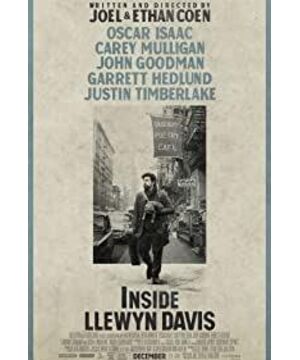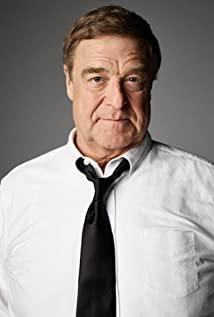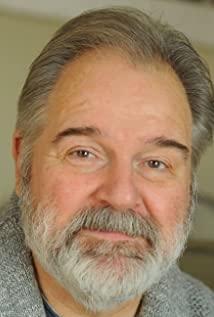Before the silver screen was turned on, I heard the usual chatter in the Qing Bar. The warm singing sounded, this is the kerosene lamp bar (The Gaslight Cafe) in Greenwich Village in 1961. After LeVine's successful performance, he was taken to a back alley and beaten. This is a talented singer who keeps screwing up his life.
Levine is pathetic and hateful. He's homeless and can't even be a likable coucher. His sister wanted to take him in, but he didn't care. He wore a borrowed coat in the harsh New York winter, and the occasional alms of his agent was not enough to make ends meet. Had a relationship with Jane, the wife of a friend, but couldn't even get the money for an abortion. Accidentally found out that his ex-girlfriend didn't have an abortion, and took his child back to his hometown where he couldn't find or go. He hates chasing fame and fortune, and looks down on singers who pursue a stable life, feeling that they are subservient to commercial purposes. He disdains following the rules, feels uncomfortable on the Upper West Side, despises academics, sees them as dead and pitiful. He doesn't want to use his dreams to just entertain others.
But LeWine wasn't always a nasty wretched bastard, LeWine once had a folk-dream partner. Even if things weren't good before, at least he wasn't alone. Two young people are eager to try on the ballad road, expressing themselves sincerely but not being recognized for a long time. Mike finally couldn't bear the pressure and chose to jump off the Washington Bridge. LeVine was left with a cynicism and a waning spirit on the one hand, and on the other hand, he hated the commercialization of ballads. Really sad.
He decided to give himself one last chance and try his luck with Grossman in Chicago. The bad luck continued, the hitchhiker died on the road, and the socks were wet from the highway to Chicago in the winter. Finally met Grossman, but LeVine's soulful singing was exchanged for "I don't think this kind of song can make money." Grossman suggested that he find a partner, saying that is the trend of folk music.
Le Vern is finally saying goodbye to folk songs. The last time he came to kerosene lamp to sing to save money, the utilitarian and sleazy owner of the kerosene lamp told him that Jane had slept with him for a chance to stay at the venue, complaining that the bar was doing folk songs and this kind of garbage no one listened to. It's not enough for his rent, these singers are worthless except for selling their faces, and they have completely insulted his folk dreams. And so we go to the opening scene again, and hear LeVine sing the song he sang with Mike for the last time, and then go to the back alley and get beaten up. The movie ends here.
Throughout the film, Le Verne is given little hope, or that his time has given him no hope. His experience is as written on the poster in front of the cinema - A fantastic true-life drama. In that era and society, people who didn't understand folk songs looked down on them, and most of those who knew folk songs were trying to develop them commercially. Even if there are already some famous folk singers, most of them have to be careful, walking on thin ice. When is this not the case? How much of Le Verne is unknown?
It is not surprising that Le Vern, who stubbornly insists on his dreams, is thrown away by the times, and the directors of the Coen brothers only allow the audience to experience his painful journey like a long snowy night with him. But at the end, as LeVine walked down the back alley, Bob Dylan took the stage and played his "Farewell." Just in January 1961, the young Zimmerman changed his name and came to New York alone, trying to be a folk singer.
In addition, this is also a precious nostalgic film, and it is also a good music film, if you also like folk music. "If a song doesn't sound new or old, it's almost a folk song." Folk songs come from the common people and are a form of popular music that is particularly good at expressing ideas. Therefore, it is different from jazz or rock, in order to let the audience hear the lyrics more clearly, it only takes the form of simple instrumental accompaniment. This candidness of singing her thoughts out loud makes it all the more moving. The 1930s was the red decade in the United States, and communism was once a smash hit in the United States. The collective warmth and enthusiasm that guilds and collectivism bring to the commoners can also be felt in the songs of the Weavers, especially Pete Seeger. However, during World War II and the Cold War, these leftist folk singers were alienated and excluded, and no one dared to approach this group of aliens. Until the icebergs of the Cold War began to melt in the late 1950s, and Elvis Presley and a group of black blues players faded out, folk singers gathered in places like Greenwich Village.
The labels that are unique to many eras in the film, such as "Private Elvis Presley" mentioned by Troy, are naturally worth mentioning. The prototype of Bud Grossman, Albert Grossman, is the sharpest manager in the history of folk music. He has few singers but all of them are popular all over the world, and he has almost influenced the development of American folk music. He was the one LeWine was looking for when he wanted to try his luck at the end. The two male and one female group mentioned by Grossman in the film is the later famous Peter, Paul, Mary group. At that time, folk songs were a big trend, and Grossman, as a successful agent, accurately observed this trend, and changing the names of the three people to the names of three saints in the Bible would obviously not be the choice of the angry young Levine. In addition, the kerosene lamp bar at the beginning and end of the film was one of the most famous bars for performing folk music in Greenwich Village, New York at that time, and almost all the most famous folk singers in the United States got attention from here.
Greenwich Village at that time brought together the marginal or avant-garde, anti-war democrats of the society at that time, including avant-garde artists represented by the Beats, various gays, and folk singers. The driver on the way to Chicago was a Beat, reciting Peter Orlovsky's Clean Asshole Poem aloud late at night in a deserted highway restaurant, surreal. Although the singer Troy is still in service, he is staunchly anti-war, "even war toys are not supported."
Finally, it is a digression. After searching, it is found that the real prototype of Llywyn Davis is Dave van Ronk. After the film was released, it attracted attention again. It's a remake of Rodriguez from Finding Sugar Man. Seeing Jim & Jean's house full of folk records, I can't help but wonder how many singers in that era were buried in the era? The answer can only be in the wind.
Another recommendation is "Rebel from the Folk: The Legend of American Folk Songs". Welcome to share more and better music.
View more about Inside Llewyn Davis reviews











